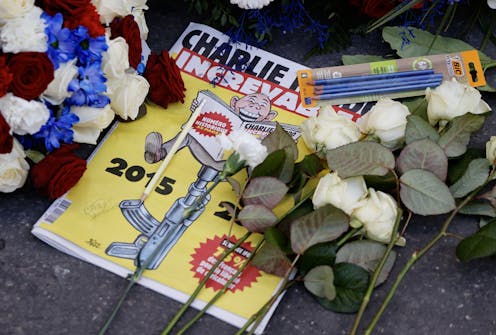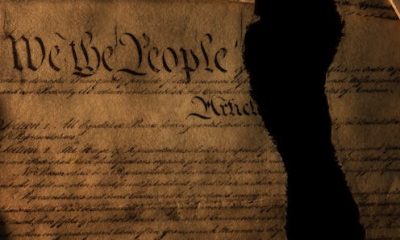
A special edition of French satirical newspaper Charlie Hebdo commemorates 10 years since an Islamist attack in 2015. Photo by Ludovic Marin/Pool/AFP via Getty Images
In January 2015, 12 people were killed at the French satirist magazine Charlie Hebdo’s office after it published controversial caricatures of the Prophet Muhammad. Ten years later, the tragic events continue to resonate in global conversations about limits to the freedom of expression.
The attacks led to an outpouring of public sympathy for the victims, summed up by the slogan “Je suis Charlie” – “I am Charlie.” This slogan became a symbol of solidarity and declared support for freedom of expression and France’s tradition of using satire in art and media.
Since then, Charlie Hebdo has been framed as a universal symbol of freedom of speech. Yet, for others – especially French Muslims – the magazine represented the reinforcement of racial and religious stereotypes under the guise of satire.
As a scholar who studies secularism in Europe, I argue that communities’ reactions to satire are deeply influenced by factors such as religious marginalization, political exclusion and cultural tensions.
The attack was a horrific act of violence that cannot be justified. However, the discussions that followed often overlooked the ways in which the magazine’s caricatures perpetuated racist stereotypes – particularly against Muslims, who occupy a precarious position in French society.
Punch up, not down
The underlying question of satire’s ethical limits lies in its relationship to power. At its best, satire critiques authority, exposes hypocrisy and challenges systems of dominance.
Jonathan Swift’s 1729 book “A Modest Proposal,” for example, ridiculed British exploitation of the Irish. Similarly, The Onion has published pieces lampooning billionaire greed, and comedian Hasan Minhaj criticized Saudi Crown Prince Mohammed bin Salman for human rights violations.
I would argue that effective satire should “punch up, not down” – targeting those in positions of power or privilege rather than vulnerable communities who already face oppression.
When satire targets marginalized groups, it can strengthen harmful stereotypes instead of challenging them. For example, Charlie Hebdo’s caricatures of Muslims relied on stereotypical and dehumanizing images – often portraying them as violent extremists.
Charlie Hebdo’s caricatures were not isolated cases; they reflected and reinforced broader narratives in French society that link Islam with backwardness, violence and resistance to integration. In a country where Muslims already face discrimination in jobs, housing and policing, such portrayals can deepen their marginalization.
Supporters of Charlie Hebdo’s style of art pointed out that the magazine has also made fun of Catholics. For instance, the magazine’s cover in 2013 depicted Pope Benedict XVI resigning from the papacy to elope with a Swiss Guard – a satirical critique that highlights the church’s strict views on homosexual relationships.
Charlie Hebdo’s satire of Catholics, however, works differently. While it often harshly criticized the Catholic Church, its target was an institution deeply embedded to France’s culture and history.
Even as religious adherence declines, Catholicism remains deeply intertwined with French national identity in ways that Islam does not. Criticism of the Catholic Church, therefore, challenges a powerful institution, whereas criticism of Islam often targets a marginalized community.
Laïcité and its application
Muslim women hold a demonstration at Place de la République on Oct. 19, 2019, in Paris.
Photo by Dominique Faget/AFP via Getty Images
At the heart of this disparity lies France’s strict commitment to laïcité, or secularism. France’s commitment to laïcité is meant to ensure religious neutrality but has often been used to target Muslims unfairly. Many, including myself, would argue that policies like headscarf bans in public schools, for teachers and students alike, and limits on public expressions of Islamic faith have turned laïcité into a tool for exclusion rather than inclusion.
According to some critics, the 2019 Notre Dame fire further exposed the “hypocrisy” of laïcité. While the French government raised nearly US$1 billion to restore the cathedral as a symbol of French heritage, Muslim communities continue to face barriers to building mosques, with local authorities citing the policy of laïcité to block their efforts.
In this context, Charlie Hebdo’s satire of Muslims echoed state narratives portraying Islam as clashing with French secular values. One infamous cartoon showed the prophet with a bomb in his turban, reinforcing the stereotype of Islam as inherently linked to terrorism. Another featured the prophet in sexually suggestive poses, which sent the message that Muslims are sexually strict and backward, while French secular society is modern and free. It fed into old colonial beliefs that Western culture is superior and that Muslims need to be liberated from their alleged backwardness.
Instead of challenging authority, these caricatures often mirrored and reinforced the Islamophobia already prevalent in France. Critics point to examples such as the disproportionate policing and surveillance of neighborhoods with large Muslim populations, which effectively criminalize these communities. Therefore, they argue, Charlie Hebdo’s style of satire crossed the line between critique and complicity, aligning itself with state narratives rather than resisting them.
Rethinking the legacy of Charlie Hebdo
Looking back on 10 years of debates since the Charlie Hebdo attacks, it is clear the discussion must move beyond framing the issue as free speech versus censorship. Instead, I believe the focus should shift to what satire ought to convey in a society striving for equality and justice.
Scholar of Francophone studies Nadia Kiwan writes that the “Je suis Charlie” slogan pushed people to conform to a single way of expressing support, making it hard for those with different views to speak up. She points out that this pressure to agree with the slogan silenced important voices – particularly those attempting to explore deeper causes of the attacks or to question how France handles issues like freedom of speech, equality and diversity.
Satire that uses racist stereotypes can strengthen existing social discrimination and inequalities, instead of challenging power.
A truly inclusive idea of free speech, I believe, must take into account how marginalized groups experience such portrayals, and ensure that freedom of expression does not come at the cost of dignity or respect for others.
Armin Langer does not work for, consult, own shares in or receive funding from any company or organization that would benefit from this article, and has disclosed no relevant affiliations beyond their academic appointment.
Advertisement

Advertisement
Contact Us
If you would like to place dofollow backlinks in our website or paid content reach out to info@qhubonews.com









